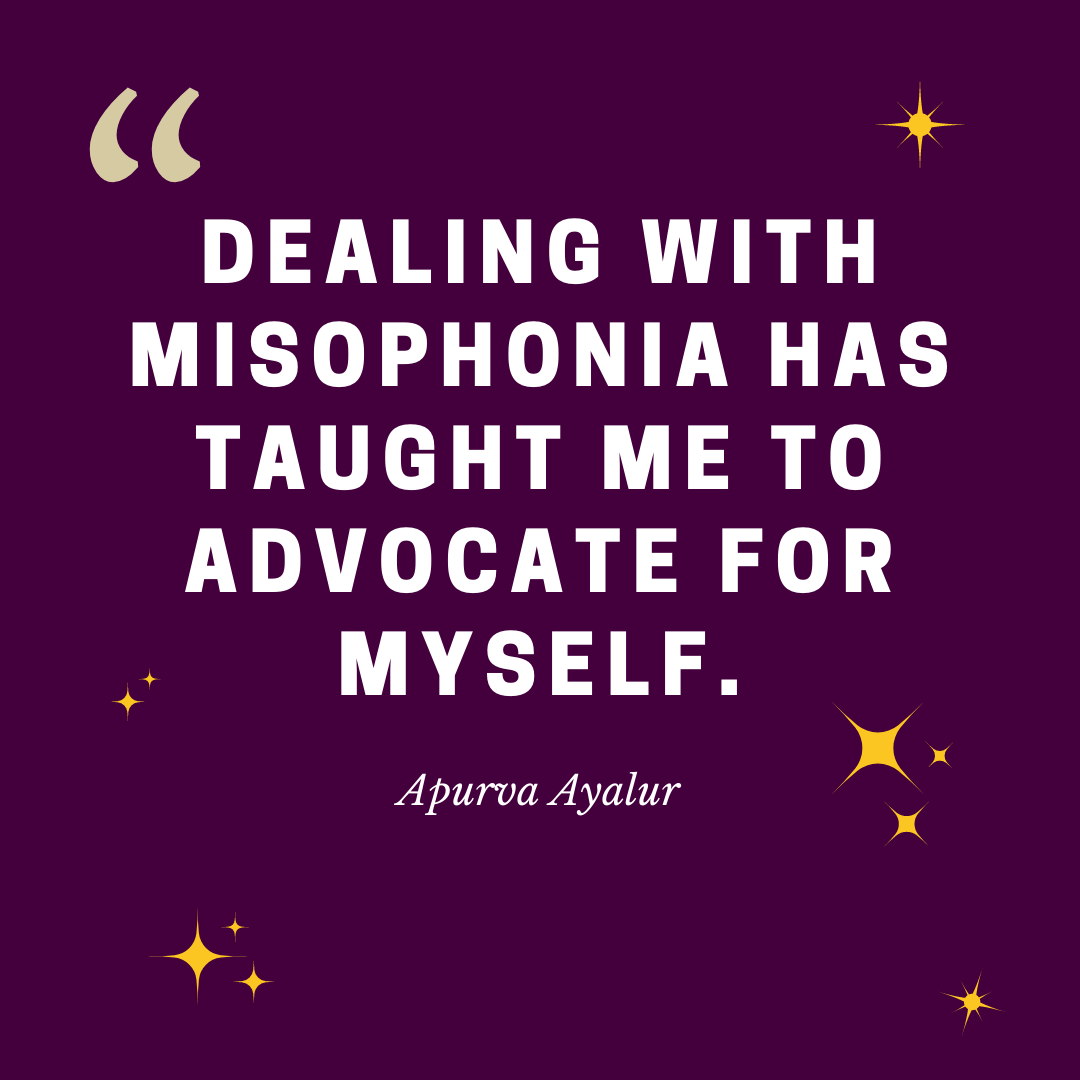Apurva’s Misophonia Story
Apurva is a student who struggles with misophonia. Read more about Apurva’s misophonia story!
Hi! My name is Apurva and I'm someone who just so happens to deal with misophonia. It’s hard, being a high schooler, stressed out about college applications and homework, stress eating, but struggling to chew a piece of bread without wanting to throw something. What triggers me is the sound of chewing. The slish-sloshing of saliva in someone’s mouth is enough to make my blood boil.
How did I know I had misophonia?
I realized this in my sophomore year of high school when I was stuck in the house with my family and my anxiety levels crept up. Sure, in the past, I would get mad about people chewing, but I always brushed it off as a simple pet peeve. But over quarantine, I couldn’t bear sitting at the dinner table as I heard my family monch down their food. It was a Sunday when I realized that the “simple” pet peeve might be something more.
I was stressed about the upcoming exams that week and was forced to sit with the family at lunch. I’m not really sure what clicked, but I found myself feeling like I was drowning—only I wasn’t in the water. I realized that the intensity of my lack of comfort combined with my stress triggered an anxiety attack— my first one. I had this happen the following week. And the next. And eventually at school. And every single time, it was the sound of chewing that made me break. I went on Google and searched up why I feel intensely angry when I hear people chew.
My answer? I have misophonia.
“Dealing with misophonia has taught me to advocate for myself.” ~ Apurva Ayalur
I found out and immediately sent a Harvard article detailing misophonia to my parents. They started to understand why I got mad and tried to act supportive when I excused myself from the dinner table. There are still times when they make fun of the disorder— acting as if I am dramatizing something very real to me— but I constantly try to educate them when they do so. It’s a work in progress, but having statistics about misophonia in the back of my head truly helps when I’m trying to convince them that my emotions are real.
Now, I sometimes wear AirPods at the dinner table or start eating after everyone else has finished to make sure that I do not get triggered. It’s embarrassing to not be able to eat with your parents without crying, but we have worked through it as a family and are trying to find the best solution for us.
After I told my parents, I started to tell my closest friends. I like to say that there is one thing that assures me that I have made a true friend: only a true friend would mute themselves on FaceTime when they are eating. I distinctly remember calling my best friend and muting herself for every bite of food that she ate. I didn’t even notice until I asked her a question and she held up her finger. One second. She then finished chewing, unmuted, and responded. I was so touched I broke into tears. It’s small gestures like this that make it easier to cope with the disorder. Being at school means that I have to hear people chewing all the time, whether they chew gum or food. Surrounding myself with people who are mindful of their chewing sounds makes it easier for me to go about my life without constantly wanting to throw rocks at people.
“It’s small gestures like this that make it easier to cope with [misophonia].”
It’s interesting to try to explain to people what misophonia even is. I used to say, “I get extremely angry when I hear people chew.” I found that I got brushed off. People equated it to something that just “bothered” me, not understanding the severity of the condition. I now explain it as “I feel like needles are poking my brain and 100 kids are screaming when I hear the saliva in your mouth break down your food.” It seems to do the job. I get a couple of weird looks from my relatives—uncles and aunties who don’t fully understand why I can’t sit at the table with them. People misunderstand my distance and take it as an insult, and in my culture, slurping and chewing loudly is a sign that the food is good. I don’t want to stop them from enjoying their food, so I sit back. I stay upstairs until my mom calls me after everyone is finished eating. The routine might insult a few, but at the end of the day, it is healthy for me.
Dealing with misophonia has taught me to advocate for myself.
I’m better at kindly requesting if people would chew with their mouths closed, better at knowing when to step away from the table when I get overwhelmed, and better at explaining why I get angry. While having the condition doesn’t exactly make life easy, knowing that it is a thing—that my anger is not totally irrational—makes me feel better. So, if you read any of this and any part connected with you, maybe you have misophonia.
Maybe you are also part of this growing community.
This is my story! I hope this helps.



